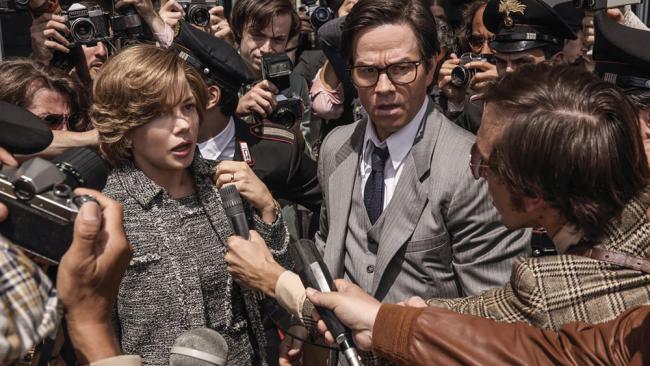Review: All The Money In The World

In the backdrop of a kidnap drama, "All The Money In The World" is an interesting portrait of J. Paul Getty, "the richest man in the history of the world during his time".
Based on the 1995 book titled "Painfully Rich: The Outrageous Fortunes and Misfortunes of the Heirs of J. Paul Getty" by John Pearson, the film dramatises the 1973 abduction of John Paul Getty III, the grandson of J. Paul Getty.
Without much ado the opening scene, in black-and-white frames, plunges into the abduction of the boyish, long-haired young Getty, who is out on the streets of Rome sparring good-naturedly with some wanton ladies.
After the abduction, we are regularly reminded about the young boy's rich grandfather and at the same time are provided with insights into the old man's eccentricities and his relationships with others in the family and society. His miserly attitude -- and he has his reasons for every action of his -- sharply chisels his character making him interesting as well as despicable.
He famously states: "If you can count your money then you are not a billionaire." But after the boy's mother, Abigail Harris, who is estranged from her husband, gets the ransom call demanding $17 billion for his release, Getty Sr. refuses to pay. He cites that paying the ransom would risk the lives of his other 14 grandchildren too.
Instead he appoints Fletcher Chase, a former CIA agent and his chief of security to negotiate.
As the clock ticks, how the haplessly penniless mother and Chase negotiate not only with the kidnappers to reduce the ransom but with Getty, too, to pay the amount, forms the crux of the tale.
Taking a few liberties with the historical records, scriptwriter David Scarpa blends the narrative of the kidnapping thriller into a character-driven plot astutely. He keeps you glued to the screen throughout its two hours twenty minutes run-time. Every character is well-etched and the actors deliver efficiently.
While the kidnapping and the escape scenes are straightforward, the plot delves on the characters of Getty Sr and Abigail Harris and they are naturally the stars of the show. Christopher Plummer essays the role of Getty Sr. and Michelle Williams plays Abigail Harris. Slipping into the skin of their characters, they both enrapture you with their fascinating performances.
Mark Wahlberg does not leave an impression. As Getty's smooth-talking fixer Fletcher Chase he is serviceable. He underplays his role and probably that's why the others shine.
Charlie Plummer, as the kidnapped Paul, is perfunctorily amiable. You do feel sorry for him, when he can't understand as to why it is taking his family so long to get him released and especially after his ear is sliced and sent to the local daily's office. Romain Duris, as the Italian ruffian named Cinquanta, has his moments of onscreen glory.
On the production front, director Ridley Scott deploys a few borrowed flourishes to make this film look interesting. The black and white scenes remind you of Federico Fellini's "La Dolce Vita", and in the later scenes where the lonesome Getty in his ornate mansion is seen distressed, brings to mind Orson Welles' Citizen Kane.
The locations, the production designs by Arthur Max, the costumes by designer Janty Yates reflect the era perfectly and this is dexterously captured by Dariusz Wolski's cinematography. His frames along with Daniel Pemberton's fine score are seamlessly layered by editor Claire Simpson.
Overall, the film is an ingeniously crafted, tension filled, kidnapping drama that won't disappoint you.
Troy Ribeiro




